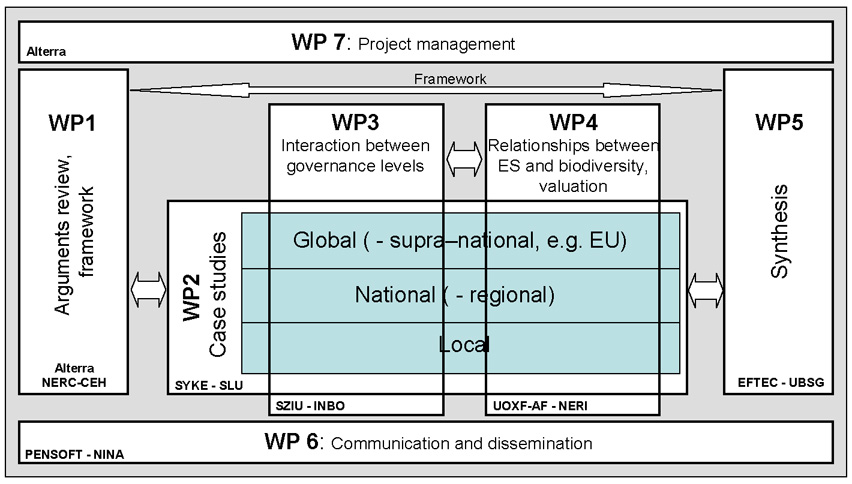BESAFE aims to address the utility of arguments for biodiversity protection in many different decision-making situations, ranging from international to local and in many different ecological, economic and social settings. The case study approach is the best suited approach to create concrete, context-dependent knowledge, and is therefore central to BESAFE. Case studies are chosen according to a framework with governance scale as the main stratification, because they are the main levels for biodiversity policy framing and implementation. A second reason is that this setup offers good comparability between case studies within scales as well as between the scales themselves. The work packages setup of BESAFE is shown in figure 1.4.
In the preparatory Work Package 1, we will first collect all information necessary to make sure that the total range of our case studies will adequately cover relevant socio-economic, spatial and temporal contexts. WP1 will therefore start by conducting a review of arguments and strategies and classify them in a framework incorporating all factors that are seen as, or have been proven to be, of relevance to their effective use. Work package 2 will carry out all case study work. The work package will start with selecting our case studies from the candidates already chosen during the proposal phase. All candidates will be reviewed for their availability of data and fit within the framework classification. Second, WP2 will refine the methodology to assess differences in the use of (types of) arguments and their effectiveness and the scalability and transferability of values, in cooperation with WPs 3 and 4. After the methodology is finalised, WP2 will collect case study data and analyse the data. Work Package 3 will develop the methodology for studying the interactions between governance scales, integrate it within the overall case study methodology, in cooperation with WP2, and coordinate case study work related to MLG, including analysis of relevant data collected in WP2. Work Package 4 will do the same for studying the relationships between biodiversity, ecosystem services and values. Work Package 5 will synthesise all the results into an integral framework (based on the WP1 framework) that will improve insight and understanding of the (inter) dependency of the effectiveness of different types of arguments on differences in perceptions (who?), differences in ecosystem use (where?), policy and implementation phases (when?) and differences in communication (how?). Work Package 6 will communicate to and review with stakeholders the methods and results. WP6 will also disseminate project results to scientific and policy target groups. In this WP we will exploit our connection to the PEER, ALTERNET and associated experts networks to the full extent. Work Package 7 will involve all project management activities.

« Back  Print view Print view
|